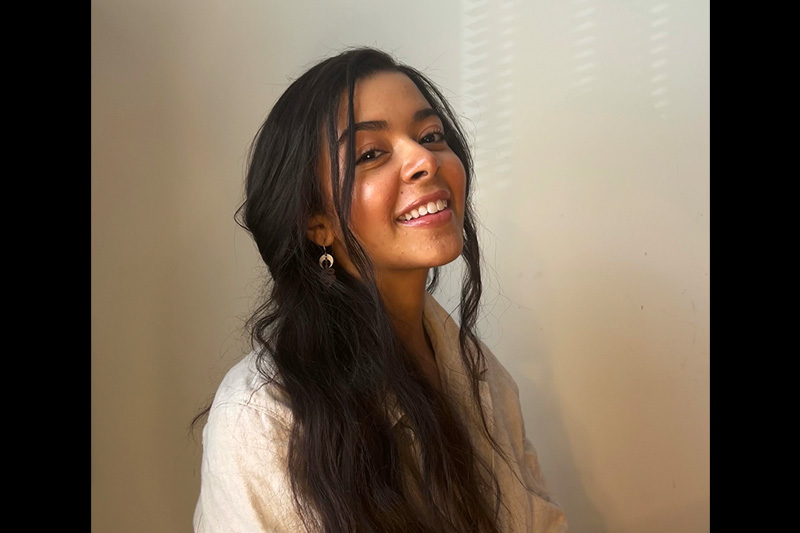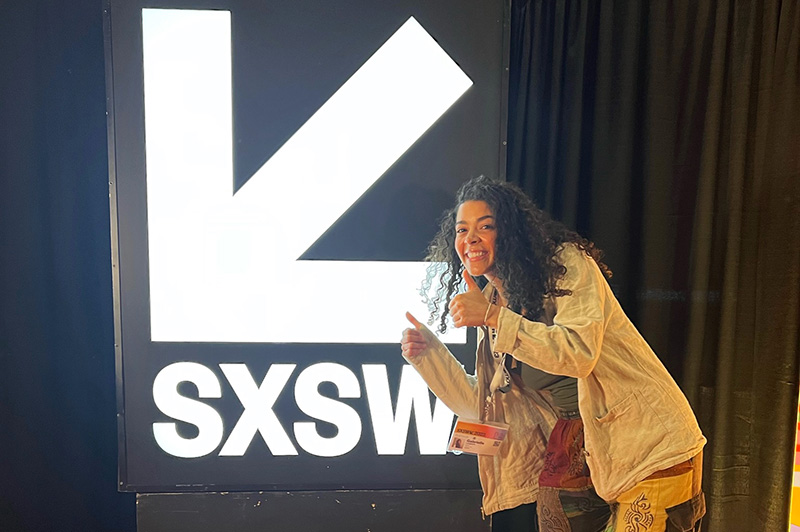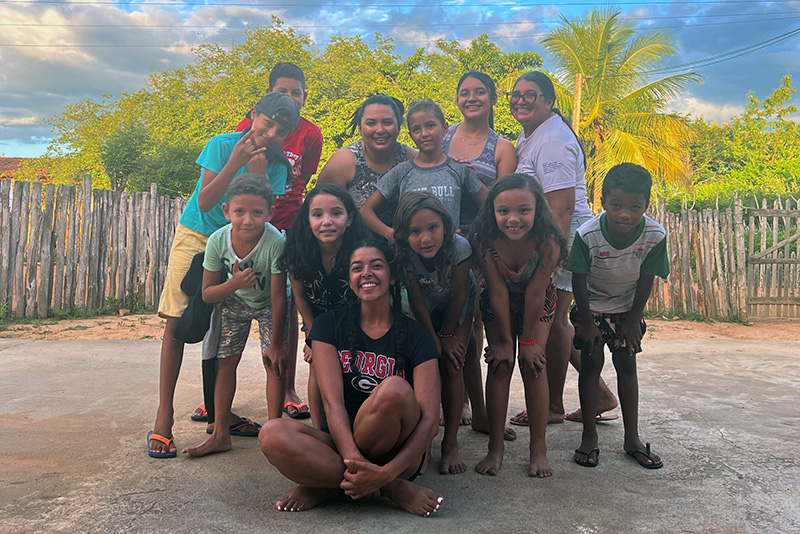Written by Jacob Smith, Graduate Assistant of the UGA Graduate School
Interview with Gabrielle Langhorn, PhD student

photo courtesy of Gabrielle Langhorn
Gabrielle Langhorn is a PhD student in the Department of Anthropology at the Franklin College of Arts and Sciences. She lives a double life.
By day, Langhorn keeps up with coursework and research, but by night she is a social media content creator and educator with a large and diverse following.
Creating educational content about lifestyle sustainability
“I use daily swaps such as switching soap bottles for bars of soap, and I use that as a gateway to learning about environmental justice, climate change, and broader impacts,” Langhorn said. “I want to allow others to be more mindful and ethical through their consumption and more aware of global human rights issues.”
Langhorn mostly publishes on TikTok and Instagram, utilizing resources as a member of EcoTalk Collective, a larger collective of 18 individuals who work with TED, Meta, SXSW, and more. The EcoTalk Collective found her through her social media content which she has been posting for over a year and a half. She creates many videos that focus on environmental justice, and the group added her for the expertise she provides in that industry.
Langhorn’s impact focuses on smaller communities where she shares knowledge. “I grow community through these spaces,” she said. “One of the events I hosted at SXSW discussed how to build community in the climate space.” This event, titled Climate 101, was a mixer with another EcoTalk Collective member, Wanjiku Gatheru. The pair brought together people based on region, their climate interests, and other facts to discuss and network.
A second event that Langhorn was a part of was titled Relatable AF. “It was about making news information relatable and learning how to gain trust with your audience,” she said. She also hosted a happy hour at SXSW where they invited local climate leaders’ bands to participate. The event was sponsored by local breweries and restaurants as a way to raise local awareness.
Langhorn explained how aspects of SXSW can be destructive to the community. Her group wanted to make sure they addressed this issue and took steps to help. “We used the proceeds from this event to stock community food fridges throughout Austin, Texas, to assist with environmental justice and food insecurity issues,” she said.

photo courtesy of Gabrielle Langhorn
After graduation, Langhorn is looking into consultation and event speaking roles.
She recalls her first big speech at Spotify headquarters, where she talked about environmental justice and corporate sustainably. “I really enjoyed that and want to use these events and consulting to focus on more community outreach, breaking down barriers of education,” Langhorn said. “I want to disseminate information in an understandable way for free.”
Although she is still a full-time student, her work is impacting many different people right now. On one hand, her involvement with educating the public builds a more knowledgeable community. On the other hand, she is directly impacting smaller communities by performing research.

photo courtesy of Gabrielle Langhorn
On the UGA side of her life, Langhorn’s research focuses on human/nature relationships in Brazil.
She observes soil from a social side rather than an ecological side. “I’m working in Caatinga, Brazil, an agriculture area,” Langhorn said. She explains that she is not sure how she got into studying soil, but she is thankful that she did.
Langhorn’s undergraduate degree is in biology, with a minor in environmental science. After the pandemic, she shifted her focus from working with animals to working with people. “I wanted to understand how people see the world from different cultural perspectives so that I can meet people where they are through education and community outreach,” she said.
This newfound passion led her to begin studying anthropology. “I did pre-dissertation work to solidify my field site, and I am going back in May to stay for over a month to work some more with the communities and start the first phase of data collection,” she said.
Her research falls under the working term anthro-pedology, the study of culture and soil. Her research is a niche yet extremely interesting subject. “I am looking at how farmers in Brazil experience and use the soil and how they relate and connect to it,” Langhorn said. “I want to see how their actions benefit or harm the soil because it’s an area that is experiencing intense land degradation.” The land is changing, and the farmers are having to adapt their livelihoods and connection to the land as a result. She wants to learn about this human/nature relationship through oral and family histories. She is also comparing this research to descriptions from policymakers and academics and how they describe and experience soil, noting the differences from the local farmer’s descriptions.
A highlight of Langhorn’s experience through all of this has been the traveling that has provided her with the opportunity to meet different communities and the ability to tie together her school and work.
“I have had more professional development in the past year just from being able to go to academic conferences and then going to content creator networking events,” Langhorn said. “It has helped me be able to communicate with completely different audiences and cater conversation style to my audiences.”
Langhorn’s impact is far and wide for an individual, but she keeps a level head by knowing that her work is making a difference around the world.
